Sometimes English football is so conservative you feel it should wear a blue rosette, serve cucumber sandwiches with the crusts sliced off and be done with it. Last week was one of those occasions. Brentford – the chief cymbal-clappers for analytics in football – had sacked their manager, Marinus Dijkhuizen, eight games into the season. And so came the cackles and told-you-sos from former players and some in the media. How dare they try to do something different. And look where it got them.
The truth behind the story is slightly more complicated. Brentford insist Dijkhuizen’s sacking had little to do with results, but what was happening on the training pitch. Some even knew they had the wrong guy before the season started. Even so, it was embarrassing for a club with so many smart people to get it so spectacularly wrong. And doubly so when Mark Warburton, who took Brentford to the play-offs last season only to leave when asked to give up his veto over transfers, is flying with Rangers in the Scottish Championship.
But to use Dijkhuizen’s dismissal as a stick to put analytics back in its box, as some have done, seems strange. We all understand the numbers game a little better these days, helped by Sky’s Monday Night football and Match of the Day using strikers’ goals per 90 minutes rather than goals per game, or a midfielder’s key passes rather than assists, to provide a deeper context.
And while Brentford struggle, the analytics approach is working at Midtjylland, the club in which the Brentford owner Matthew Benham invested last summer. Eleven months later, they clinched their first Danish Superliga, and have won their opening two Europa League group games, a feat no British club has achieved. Last season, Midtjylland, along with Atlético Madrid, led European football in set-piece goals. They believe that is not down to chance.
So why does analytics provoke such a gag-reflex in some quarters? When it comes to former professionals such a reaction is not hard to understand. They have decades of experience and knowledge. Having some youngish maths whizz explain why their team has been lucky in matches based on statistical techniques is hardly going to go down well. Few old pros learned regression analysis on YTS schemes.
But it does not help the cause of analytics when clubs are coy about how much they use it, although that is understandable – if someone knows they have an edge, they are hardly going to reveal their secret source.
Liverpool’s director of research Ian Graham has a PhD in theoretical physics, Arsenal bought Stat DNA to help with scouting, tactical insights and game preparation, and Aston Villa recently recruited Hendrik Almstadt from Arsenal as their first sporting director. But we do not know whether these analysts are an essential cog in the wheel – or modern day Bertha Antoinetta Masons in Jane Eyre, squirrelled away in the attic, far from prying eyes.
That said, almost every Premier League and Championship club pays Prozone and/or Opta for their services. I know of Premier League clubs who get an SMS at half-time and full-time saying if they deserve to be winning or losing based on an expected goals model, which assigns each shot a probability of going in based on the location on the pitch and other factors. And there are clubs who use analytics to see whether their league position accurately reflects their performances on the pitch.
That is analytics, right there. At boardroom level there is an increasing willingness to use data to make decisions – which extends to evaluating the success rates of transfers and, in some cases, their academy. Such an approach has yet to percolate down to the most coaches. Perhaps it will, perhaps it won’t. But it is worth stressing that embracing analytics shouldn’t turn managers into automatons.
The former Midtjylland manager Glen Riddersholm said Benham’s approach was “fantastic” precisely because it was different “in what is a very traditional and conservative world”. But he said that when the technical scouts found a potential player he always wanted to look them in the eye and “talk about his values as a human being” before agreeing a deal. Analytics is simply one of many tools at a club’s disposal.
Bill Gerrard, a technical analyst with Saracens who now helps out his friend Billy Beane at AZ Alkmaar, is concerned at the reluctance of some in English football to embrace analytics. “When a team adopts a more analytical approach and things go wrong, it gives an opportunity for the anti-analytics brigade to voice their deep-rooted prejudices,” he says of the Brentford situation. “But I would actually broaden the discussion and ask if there is any link between the resistance to embrace evidence-based practices including analytics, the relaxation of budgetary pressures through the increased media deals, and the failure of British teams to compete effectively in Europe. Perhaps we are too attracted to quick-fix solutions – buying a new player, replacing the manager, etc – and have lost a sense of the art and science of building successful teams?”
That is an argument for another day. What we can say is this: Brentford got it horribly wrong with Dijkhuizen, and they will get plenty more wrong in the future. But despite this nasty hiccup they still believe they have an edge. And over the long run they intend to prove it.

